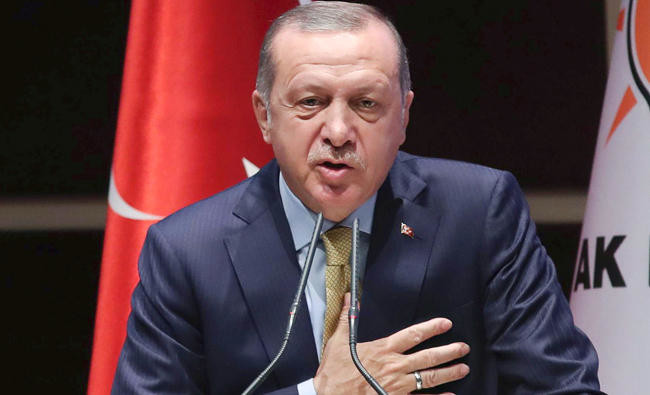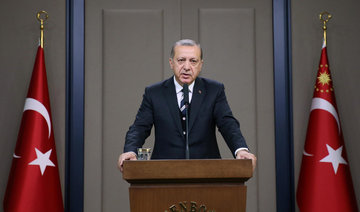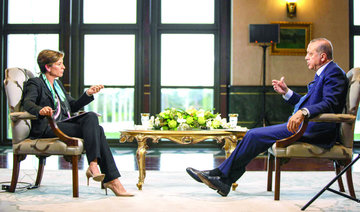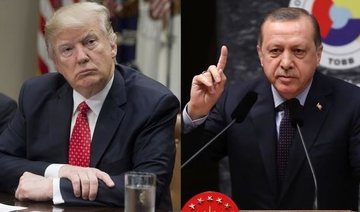ANKARA: Amid bilateral tensions over various issues, US President Trump and Turkish leader Recep Tayyip Erdogan spoke by phone on Saturday and according to the announcement made by the Turkish presidential office, they agreed to promote regional stability and to boost bilateral ties.
The two leaders also agreed to meet in New York during the UN General Assembly due this month.
The two countries are experiencing difficult relations at present, marked especially by Washington’s support for the Syrian Kurdish militia, YPG, as a local partner in the battle against Daesh; Ankara views YPG as a terrorist group.
Another disagreement between Turkey and the US pertains to the requested extradition of Pennsylvania-based cleric Fethullah Gulen, who is considered by Turkey as the mastermind behind last year’s failed coup attempt.
Erdogan recently slammed the US over an indictment of Turkey’s former Economy Minister Zafer Caglayan on charges that he had conspired to help Iran violate US sanctions by illegally transferring hundreds of millions of dollars.
Erdogan sees the indictment as a mistake and as a political move against Turkey. Claiming that Caglayan had not engaged in any wrongdoing, Erdogan told reporters as he was departing for Kazakhstan, “There are bad smells coming from behind this.”
“I hope we’ll get a chance to discuss this issue in the United States. You may be a big nation, but being a just nation is something else. Being a just nation requires the legal system to work fairly,” he said.
In addition to that, a US Senate committee on Thursday approved a measure to block the US government from supporting weapons sales to security forces protecting Erdogan. The move was in response to the violence against protesters that was carried out by Erdogan’s bodyguards during his visit to Washington this spring. A total of 19 people, including 15 Turkish security officials, have been indicted and this further complicates bilateral ties.
Experts note that these key issues will top the agenda and will surely be raised by Erdogan during his upcoming meeting with Trump.
Ozgur Unluhisarcikli, Ankara office director of the German Marshall Fund of the United States, thinks that the alliance between the two countries has been reduced to transactional cooperation based on mutual distrust and grievances.
Even so, for Unluhisarcikli, there are several issues on which the two countries have mutual interests and other issues where they need to avoid collusion.
“At this point, removing the Al-Qaeda presence in Syria’s Idlib, the planned independence referendum in the Kurdistan Regional Government (KRG) scheduled for Sept. 25, how to meet Turkey’s need to train new F16 pilots to replace those that were removed from military service after the coup attempt will be the top issues on the agenda,” he told Arab News.
Concerning the controversial items on the bilateral meeting agenda, Unluhisarcikli said, “Erdogan holds the ‘Washington elite’ responsible for these developments and spares President Trump from criticism as he still hopes to build a constructive relationship with the current US administration.”
According to Ahmet K. Han, an international relations professor at Istanbul’s Kadir Has University, this visit will not see a drastic transformation in bilateral ties but it has certain important political purposes from the Turkish side.
“Turkey now, more than ever, has to maintain a balance in its foreign policy, including its relations with the United States, as its previous ambition to develop an autonomous foreign policy proved to be unsustainable — at least at the level aspired to by her decision makers,” Han told Arab News.
“Turkey’s intention is to design a renewed multi-dimensional relationship inside the Beltway. Also, internationally, it tries to avoid becoming isolated on the global stage.”
For these purposes, Han noted, Ankara now wants to establish bipartisan contacts with key individuals in Washington, including some outside the administration.
“Erdogan also aims to develop a separate, preferably a tightly circled one-on-one relationship, with Trump which will allow Turkey to bypass some influential figures within the administration, who the Turkish side sees as categorically acting against Turkish interests and restricting Trump by their foreign policy reflexes,” he said.
Experts argue that Turkey will use this month’s UN meeting as an opportunity to raise the issue of the humanitarian crisis in Myanmar where about 270,000 Rohingya Muslims have fled violence directed at them. Turkey recently extended a helping hand to the region by delivering 1,000 tons of aid for 100,000 families.
Han said that Ankara feels the UN is an adequate platform to advertise its humanitarian and “conscientious” foreign policy, augmenting its international reputation and increasing the legitimacy of its interests elsewhere, especially in Syria.
“With a claim to be a world leader, Erdogan will try and make use of this UN meeting to turn Turkey’s sensitivity about the Rohingya Muslims into a public opinion victory,” Han said.
Han also noted that frequent contacts between Trump and Erdogan also meant an effort by Turkey to anticipate the legal process in the US over contentious issues between the two countries — especially the Gulen case, Caglayan indictment and the situation with Erdogan’s security detail — with an expected concern on managing these issues.
“The Turkish approach is dominated by a strong conviction that these processes in the US are driven by political concerns, aiming to manipulate Turkey’s domestic politics, largely predicated on the repudiation of the American argument on judicial independence.”
Erdogan and Trump met earlier on May 16 at the White House and ended with joint commitments to cooperate on counterterrorism efforts. The meeting failed to deliver concrete outcomes concerning the ongoing controversies that continue to divide the two countries. Hopes are pinned on this coming meeting.
Erdogan and Trump reaffirm strategic partnership
Erdogan and Trump reaffirm strategic partnership

Reactions to the crash of the Iranian president’s helicopter

- Iraqi government said it instructed relevant bodies to offer help to neighboring Iran in the search mission
LONDON: Following are reactions from foreign governments and officials to the news that a helicopter carrying Iranian President Ebrahim Raisi and his foreign minister crashed as it flew over mountain terrain in heavy fog on Sunday.
US STATE DEPARTMENT
“We are closely following reports of a possible hard landing of a helicopter in Iran carrying the Iranian president and foreign minister,” a State Department spokesperson said in a statement.
US PRESIDENT JOE BIDEN
A spokesperson for President Biden, Karine Jean-Pierre, told reporters aboard Air Force One that the president had been briefed on the situation. She did not elaborate.
AZERI PRESIDENT ILHAM ALIYEV (Raisi was returning from Iran’s border with Azerbaijan when his helicopter crashed).
“Today, after bidding a friendly farewell to the (visiting) President of the Islamic Republic of Iran, Ebrahim Raisi, we were profoundly troubled by the news of a helicopter carrying the top delegation crash-landing in Iran.”
“Our prayers to Allah Almighty are with President Ebrahim Raisi and the accompanying delegation. As a neighbor, friend, and brotherly country, the Republic of Azerbaijan stands ready to offer any assistance needed.”
IRAQI GOVERNMENT
The Iraqi government said in a statement it had instructed its interior ministry, the Red Crescent and other relevant bodies to offer help to neighboring Iran in the search mission.
UAE food aid shipment arrives in Gaza

- Shipment arrived via the maritime corridor from Larnaca in Cyprus
DUBAI: A UAE aid shipment carrying 252 tons of food arrived in Gaza bound for the north of the enclave, Emirates News Agency reported on Sunday.
The shipment arrived via the maritime corridor from Larnaca in Cyprus. The delivery involved cooperation from the US, Cyprus, UK, EU and UN.
The supplies were unloaded at UN warehouses in Deir Al-Balah and are awaiting distribution to Palestinians in need.
Emirati Minister of State for International Cooperation Reem Al-Hashimy said that the food supplies will be delivered and distributed in collaboration with international partners and humanitarian organizations, as part of the UAE’s efforts to provide relief and address the humanitarian crisis in the Gaza Strip.
The UAE, in accordance with its historical commitment to the Palestinian people and under the guidance of its leadership, continues to provide urgent humanitarian aid and supplies to Gaza, she added.
Since the war began in October, the UAE has delivered more than 32,000 tons of urgent humanitarian supplies, including food, relief and medical supplies, via 260 flights, 49 airdrops and 1,243 trucks.
The UAE delivery came as Israel closed the Rafah border crossing. The World Health Organization said on Friday that it has received no medical supplies in the Gaza Strip for 10 days.
Helicopter carrying Iran's President Raisi makes rough landing, Iranian media say

- IRNA said the helicopter in question had been carrying Raisi, Foreign Minister Hossein Amirabdollahian and local officials
DUBAI: A helicopter carrying Iranian President Ebrahim Raisi and his foreign minister made a rough landing on Sunday as it was crossing a mountainous area in heavy fog on the way back from a visit to Azerbaijan, Iranian news agencies said.
The bad weather was complicating rescue efforts, the state news agency IRNA reported. The semi-official Fars news agency urged Iranians to pray for Raisi and state TV carried prayers for his safety.
IRNA said the helicopter in question had been carrying Raisi, Foreign Minister Hossein Amirabdollahian and local officials.
Interior Minister Ahmed Vahidi told state TV only that one of the helicopters in a group of three had come down hard, and that authorities were awaiting further details.
Raisi, 63, was elected president at the second attempt in 2021, and since taking office has ordered a tightening of morality laws, overseen a bloody crackdown on anti-government protests and pushed hard in nuclear talks with world powers.
In Iran’s dual political system, split between the clerical establishment and the government, it is the supreme leader rather than the president who has the final say on all major policies.
But many see Raisi as a strong contender to succeed his mentor, Supreme Leader Ayatollah Ali Khamenei, who has strongly endorsed Raisi's main policies.
Israel war cabinet minister says to quit unless Gaza plan approved

- Israeli PM Benjamin Netanyahu dismisses comments as "washed-up words"
- Broad splits emerge in Israeli war cabinet as Hamas regroups in northern Gaza
JERUSALEM: Israeli war cabinet minister Benny Gantz said Saturday he would resign from the body unless Prime Minister Benjamin Netanyahu approved a post-war plan for the Gaza Strip.
“The war cabinet must formulate and approve by June 8 an action plan that will lead to the realization of six strategic goals of national importance.. (or) we will be forced to resign from the government,” Gantz said, referring to his party, in a televised address directed at Netanyahu.
Gantz said the six goals included toppling Hamas, ensuring Israeli security control over the Palestinian territory and returning Israeli hostages.
“Along with maintaining Israeli security control, establish an American, European, Arab and Palestinian administration that will manage civilian affairs in the Gaza Strip and lay the foundation for a future alternative that is not Hamas or (Mahmud) Abbas,” he said, referring to the president of the Palestinian Authority.
He also urged the normalization of ties with Saudi Arabia “as part of an overall move that will create an alliance with the free world and the Arab world against Iran and its affiliates.”
Netanyahu responded to Gantz’s threat on Saturday by slamming the minister’s demands as “washed-up words whose meaning is clear: the end of the war and a defeat for Israel, the abandoning of most of the hostages, leaving Hamas intact and the establishment of a Palestinian state.”
The Israeli army has been battling Hamas militants across the Gaza Strip for more than seven months.
But broad splits have emerged in the Israeli war cabinet in recent days after Hamas fighters regrouped in northern Gaza, an area where Israel previously said the group had been neutralized.
Netanyahu came under personal attack from Defense Minister Yoav Gallant on Wednesday for failing to rule out an Israeli government in Gaza after the war.
The Gaza war broke out after Hamas’s attack on October 7 on southern Israel which resulted in the deaths of more than 1,170 people, mostly civilians, according to an AFP tally of Israeli official figures.
The militants also seized about 250 hostages, 124 of whom Israel estimates remain in Gaza, including 37 the military says are dead.
Israel’s military retaliation against Hamas has killed at least 35,386 people, mostly civilians, according to the Hamas-run Gaza’s health ministry, and an Israeli siege has brought dire food shortages and the threat of famine.
US, Iranian officials met in Oman after Israel escalation

- Washington called on Tehran to rein in proxy forces
- Officials sat in separate rooms with Omani intermediaries passing messages
LONDON: US and Iranian officials held talks in Oman last week aimed at reducing regional tensions, the New York Times reported.
Through intermediaries from Oman, Washington’s top Middle East official Brett McGurk and the deputy special envoy for Iran, Abram Paley, spoke with Iranian counterparts.
It was the first contact between the two countries in the wake of Iran’s retaliatory missile and drone attack on Israel in April.
The US officials, who communicated with their Iranian counterparts in a separate room — with Omani officials passing on messages — requested that Tehran rein in its proxy forces across the region.
The US has had no diplomatic contact with Iran since 1979, and communicates with the country using intermediaries and back channels.
Since the outbreak of the Gaza war last October, Iran-backed militias — including Hezbollah in Lebanon, the Houthis in Yemen, and armed groups in Syria and Iraq — have ramped up attacks on Israeli and American targets.
But US officials have determined that neither Hezbollah nor Iran want an escalation and wider war.
After Israel struck Iran’s consulate in Damascus at the beginning of April, Tehran retaliated with hundreds of ballistic missiles and drones.
The attack — which was intercepted by air defense systems from Israel, the US and the UK, among others — was the first ever direct Iranian strike on Israel, which has for years targeted Iranian assets in Syria, whose government is a close ally of Tehran.
National Security Adviser Jake Sullivan said in a news conference this week that the “Iranian threat” to Israel and US interests “is clear.”
He added: “We are working with Israel and other partners to protect against these threats and to prevent escalation into an all-out regional war through a calibrated combination of diplomacy, deterrence, force posture adjustments and use of force when necessary to protect our people and to defend our interests and our allies.”


















